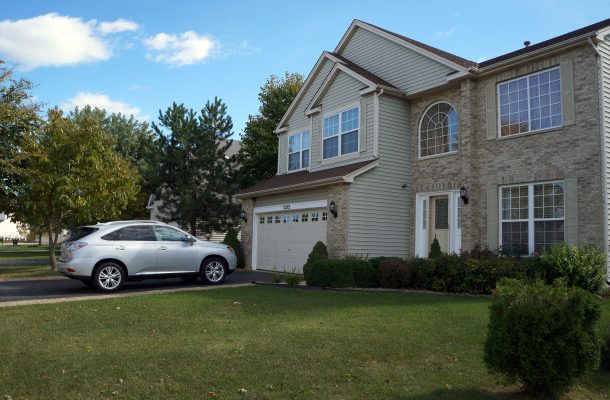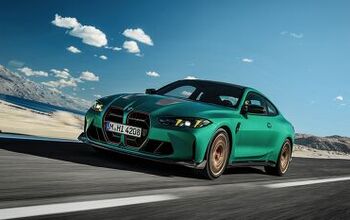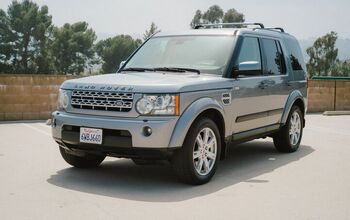Scientists Reveal What We Already Knew: Economy Cars and Gas Guzzlers Love Each Other

Picture a suburban street in an average middle class neighborhood. In each driveway sits two vehicles, as tradition states no modern American suburban family can make do with just one. Think about those two vehicles for a minute now.
Are they evenly matched? In other words, are they the same size? Do they fulfill the same requirements laid out by a single segment? Doubtful, and your mind’s eye already made this clear. One’s a Safari or Caprice wagon, the other’s a Datsun 210. One’s a Corolla, the other, a Suburban. A Focus and an F-150, and so on.
Does owning an economy car compel new car buyers to splurge when new-car buying time rolls around? Logic, and now science, says yes.
The white paper, prepared by researchers at the University of California-Davis, Massachusetts Institute of Technology and Yale University, is an involved one. Looking for equations? This crew’s framework has ’em in spades. Still, the results of the study’s social and economic model makes what we’ve known for decades clear: owning a smaller, fuel-efficient car is more likely to cause couples and families to go big with their next purchase.
Why did the researchers feel the need to prove the obvious? Well, that wasn’t the white paper’s sole intention. The researchers are more interested in the reduction of vehicle emissions, and argue that fuel economy standards might not be the best way to reduce overall emissions. That’s because ownership of a miserly fuel-sipper is more likely to lead to the ownership of a do-anything, go-anywhere utility vehicle, usually one with far less MPGs than its driveway mate.
Keep in mind that these findings aren’t the result of a survey or real-world experiment — we’re talking about estimates based on accepted scientific methodology. Reality might vary, especially in your own life. Based on an “attribute substitution” model that applies to other utility-related items, not just vehicles, the researchers estimate that for every 10-percent increase in fuel efficiency in a “kept” car (the one a couple or family already owns), the fuel efficiency of a newly purchased vehicle decreases by 4.8 percent — thus eroding the fuel savings of the older vehicle.
That’s not the only thing making that hypothetical driveway less green. Generally, miles travelled by members of a household increase following the purchase of a second vehicle. While some of the extra miles can be found on the kept car, the operation of both large and small vehicles shrinks the net fuel savings of the older economy model by over 60 percent, the researchers claim.
The findings work in both directions. The purchase of a larger second vehicle obviously translates into more fuel burned, but the purchase of an economy car as a second vehicle (if the first is a guzzler) means less fuel saved than the buyer might think. As such, the authors of the white paper feel that, in the interests of greenhouse gas reduction, efforts to change consumer behavior should focus not just on the car, but on the fuel as well.
And you all know what that means: a carbon tax at the pumps.
[Source: Wards Auto] [Image: Willard Losinger/ Bigstock]

More by Steph Willems
Latest Car Reviews
Read moreLatest Product Reviews
Read moreRecent Comments
- AZFelix With both fuel lines and battery packs, Lamborghini owners can soon wager on which part of the engine will instigate the self immolation of their super cars.
- Namesakeone The realities of the market have spoken: with a little help of a lingering recession (in that most families need a car for every purpose, rather than affording multiple cars as once was true), and with a little advertising-prodding from the manufacturers, the SUV and crossover have, in turn, replaced the station wagon, the minivan, and now the sedan. (Or maybe the minivan replaced the station wagon. Whatever.) I still like cars, but the only votes are the ones that a.) come to new-car dealerships, and b.) come with money attached. Period.
- MaintenanceCosts "But your author does wonder what the maintenance routine is going to be like on an Italian-German supercar that plays host to a high-revving engine, battery pack, and several electric motors."Probably not much different from the maintenance routine of any other Italian-German supercar with a high-revving engine.
- 28-Cars-Later "The unions" need to not be the UAW and maybe there's a shot. Maybe.
- 2manyvettes I had a Cougar of similar vintage that I bought from my late mother in law. It did not suffer the issues mentioned in this article, but being a Minnesota car it did have some weird issues, like a rusted brake line.(!) I do not remember the mileage of the vehicle, but it left my driveway when the transmission started making unwelcome noises. I traded it for a much newer Ford Fusion that served my daughter well until she finished college.


































Comments
Join the conversation
I own a F150 and a Taurus. The F150 is to tow our 3 trailers, haul ATVs, camping supplies, and various larger things. It's also pretty good in the heavy snow that we get around here in the winter. The Taurus is my daily. I've had a string of fuel-efficient cars paired with minivans and trucks, just like the research shows. As for why I have a Taurus now instead of the compact car that it replaced, I just got tired of the road noise and general discomfort of the small cars I owned. now I float to work in relative silence. It's worth the 8 mpg or so difference to me.
We have one vehicle that can do it all, that is carry people and stuff and the second vehicle, while not an economy car, the only real requirement it has is transporting typically one person from point A to point B and could transport my entire family of 5 in a pinch (it just so happens to also have 300hp). So the gas guzzler and economy car doesn't quite fit with me but the second, smaller vehicle, is more fuel efficient by a decent margin.